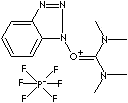HBTU
2-(1H-BENZOTRIAZOL-1-YL)-1,1,3,3-TETRAMETHYLURONIUM
HEXAFLUOROPHOSPHATE
PRODUCT IDENTIFICATION

H.S. CODE
TOXICITY
PRICE
U$1,800.- (1kg)
CLASSIFICATION
COUPLING REAGENTS /
PHYSICAL AND CHEMICAL PROPERTIES
AUTOIGNITION
NFPA RATINGS
REFRACTIVE INDEX
Stable under ordinary conditions
APPLICATIONS
Carbodiimides are a group of organic compounds which have the resonance formula N=C=N . Carbodiimide is formed by dehydration of urea or from thiourea. Carbodiimides are readily reacts with various form of amines and hydroxyl functional groups. Carbodiimides are used as dehydration agents and as activating agent of carboxylic acids to form esters or amides. The disubstituted carboxyl activating agents are used for crosslinking proteins to nucleic acids and formation of immunoconjugates in peptide synthesis. N,N'-dicyclohexylcarbodiimide (DCC) is one of the most common peptide coupling agents. It is a low melting point waxy solid; insoluble in water but highly soluble in common organic solvents like acetonitrile dichloromethane, dimethylformamide, and tetrahydrofuran. DCC is a potent allergen. N,N'-diisopropylcarbodiimide (DIC) is an alternative to DCC, DIC is a liquid and is not an allergen. 1-Ethyl-3-(3-dimethylaminopropyl)carbodiimide (EDC) is a water-soluble activating agent for amide bonding with primary amines. It also activates phosphate groups. Typically, it is utilized in the pH range 4.0-6.0 without buffers. In particular, amine and carboxylate buffers should be avoided. Carbodiimides are so active and cause racemization of the amino acid. Active esters are less reactive and less in danger of racemization. 1-Hydroxybenzotriazole (HOBt) and 1-hydroxy-7-aza-benzotriazole (HOAt) are substances that react with the O-acylurea to form active esters. HOAt is a condensation additive in peptide synthesis. It efficiently speeds up coupling process, reduces the loss of chiral integrity, and provides a visual indication (yellow to colorless) of the reaction course. Other active esters exit as non-nucleophilic anionic salts of uronium or phosphonium such as O-(Benzotriazol-1-yl)-N,N,N',N'-tetramethyluronium hexafluorophosphate(HBTU), O-(7-Azabenzotriazol-1-yl)-N,N,N',N'-tetramethyluronium hexafluorophosphate (HATU), (Benzotriazol-1-yloxy)tripyrrolidinophosphonium hexafluorophosphate (PyBOP).
HBTU is a peptide coupling reagent giving high yields with minimal racemisation, simple reaction conditions and short reaction time.
APPEARANCE
PURITY (HPLC)
99.0% min